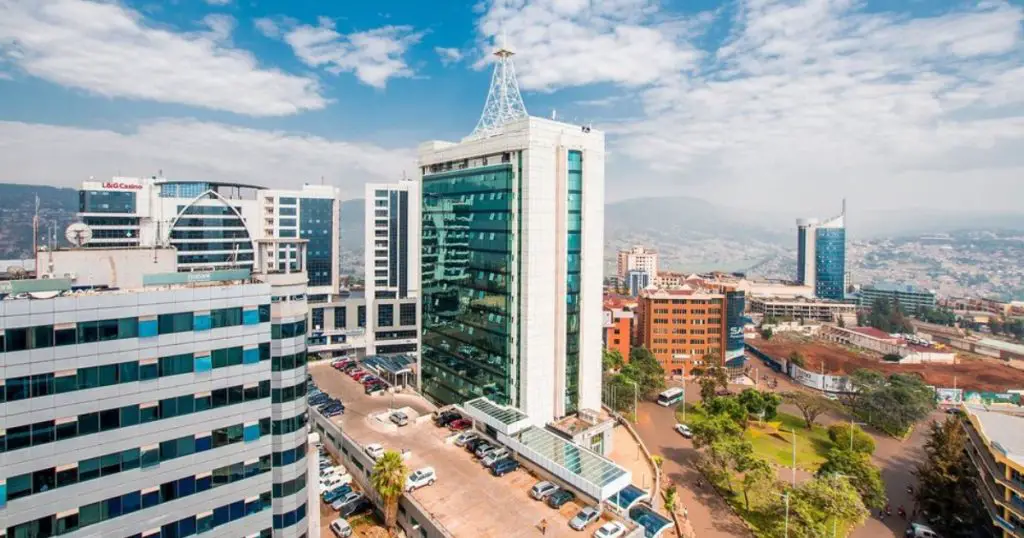Rwanda’s economy is one of the fastest growing in Africa. It has a ready market of over 12 million people with a rapidly growing middle class.
-
Rwanda’s economy is one of the fastest growing in Africa, with a ready market of over 12 million people and a rapidly growing middle class
-
Potential investment opportunities are in agriculture, infrastructure, energy, tourism, information and communication technology
-
Rwanda has an array of investment incentives for investors ready to invest in the key priority sectors, including a seven-year tax holiday for those investing over US$50 million
According to the African Development Bank Group, the country recorded a Gross Domestic Product (GDP) growth of 10 per cent in 2021. The growth was driven by expansion in services (12 per cent), industry (13 per cent), and agriculture (6 per cent). In 2022 and 2023, GDP growth is projected at 6.9 per cent and 7.9 per cent, respectively.
Rwanda is a hub for rapidly integrating East Africa. It is located centrally bordering three countries in East Africa and is part of the Eastern African Community (EAC) Common Market and Customers Union, with a market potential of over 125 million people.
Potential investment opportunities are in agriculture, infrastructure, energy, tourism, information and communication technology. Other attractive sectors include real estate and construction, financial services and mining.
Rwanda has an array of investment incentives for investors ready to invest in the key priority sectors. The incentives as contained in the investment law include exemption of capital gains tax, a seven-year corporate income tax holiday for large projects in strategic sectors, i.e. energy, exports, tourism, health, manufacturing and repatriation of capital and assets. The tax holiday applies to investors willing to invest over US$50 million.
“A registered investor investing an equivalent of at least US$50 million and contributing at least thirty per cent of this investment in form of equity will be entitled to a maximum of seven (7) year corporate income tax holiday,” the Rwandan Development Board (RDB) stated.
Those investing in products used in Export Processing Zones (EPZs) are exempted from customs taxes and duties.
Another incentive is that a registered investor who invests an equivalent of US$250,000 is allowed to employ three foreign employees without necessarily demonstrating that their skills are not available in the local labour market.
The landlocked country offers quick business and investment online registration. According to the Rwandan government, the process involves simultaneously obtaining the certificate of incorporation (business registration), tax identification number (tax registration) and social security registration for employee pension submission.
The process of starting a business in Rwanda
1. Registration
The cost of registering a local or foreign company is free. For one to register a foreign company, he/she must provide several documents. To start with, you should provide a certificate of incorporation issued by the registration authority in the country of incorporation. Also required are a duly authenticated copy of the memorandum Articles of Association, passport copies of the shareholders and a name of a director residing in Rwanda.
2. Opening a local branch
The requirements when opening a local branch are notarised resolution to open a branch, a complete application form and payment of 5,000 Rwandan francs (US$ 4.83)at the Rwanda Development Board.
3. Individual businesses
Individual businesses should provide completed application forms provided for changing particulars, original registration certificate and payment slip (receipt) costing 2,000 Rwf (US$1.93).
4. Companies
The requirements for companies are one notarised minutes of the Board meeting authorising the filing of additional activities, an original registration certificate and Payment of 7,000 Rwf (US$6.76) at RDB.
Cessation of trade activities
If a company or business wants to exit the Rwandan market, it must pay a cessation fee of Rwf 5,000 (US$4.83).
In this case, they must write a letter addressed to the registrar general, stamped by the Rwanda Revenue Authority (RRA). Other requirements are a copy of the tax clearance certificate from RRA, an original registration certificate, minutes of association notarised and a payment slip.
